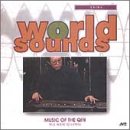| All Artists: Various Artists, Wu Wenguang Title: China: Music of the Qin Members Wishing: 0 Total Copies: 0 Label: Jvc/Sire Release Date: 1/30/1995 Genres: International Music, Pop Style: Far East & Asia Number of Discs: 1 SwapaCD Credits: 1 UPC: 009119521321 |
Search - Various Artists, Wu Wenguang :: China: Music of the Qin
 | Various Artists, Wu Wenguang China: Music of the Qin Genres: International Music, Pop
|
Larger Image |
CD Details |
CD ReviewsA tour-de-force 08/03/1998 (4 out of 5 stars) "Wu's style, whilst still evolving, already shows those trademark characteristics that distinguish him from other qin players in this later part of the century.Some of the pieces performed have been recorded elsewhere on cassette (Liu Shui, Guangling San, Jieshie Tiao Youlan, Yangguan Sandie in the Xiao Xiang Shui Yun album). However, Wu's interpretation does not remain static. Whilst Liu Shui and Yangguan have not changed much since 1984, Youlan and Guangling San have been revisited with new lenses.Youlan has an exceptional smoothness, almost playful at times, that is quite a departure from the standard interpretation of it being a wistful work depicting Confucius' disappointment at being rejected by the princes of the Warring States. There were a few startling passages; one wonders what Wu was trying to convey here. Unfortunately, the 10th century tabulature offers little clues as to the intent behind these sections, leaving one to resort to tangential re! ferences in later isonomial works from the Ming tabulatures.Playing his father's (Jinglue) transcript of Guangling should not have afforded much scope for a fresh perspective, but he managed. His 1984 recording was a shade less violent than his student's (Liu Lu); whatever inhibitions he may have had a decade earlier have clearly been discarded. Thematically, the treatment was quite appropriate, although one does wish that he had made a recording of the complete 1425 CE transcript. Guangling San is a work that demands the utmost in technique, and here Wu excels as he attacks those "Fear", "Hair-raising Anger" and "Thunderstorm" sections with much gusto.The flavour of the decade seems to be Shen Qi Mipu, the early 15th century tabulature by the Emaciated Immortal, Prince Zhu Quan. In this album, Wu presents his transcription of Qiao Ge, a late Song dynasty work attributed to Mao Minzhong found in that tabulature. Whilst there are clear! musical connections to be seen linking it to the Jiao An v! ersion favoured by the Yangzhou school, Wu's trademark style shows up here, as if defying conventional expectations of the theme. Questioning the age-old motif of a sagely recluse parting with pearls of wisdom in some hidden mountain grove, Wu's woodcutter is a loud and forceful character. Not one to retire and shy away from issues.Many adherents to the wenren (literati) model exemplified by Wu Zhaoji would baulk at Wu's Qiao Ge, but the tragedy would lie is their inability to recall Zhu Quan's observation - "In playing these pieces, the men of distinction would each reveal their disposition". The tabulatures, whilst indicating the notes, reveal very little of the rhythm, meter or note values. Wu's courage in departing from unquestioned axioms of interpretation is commendable and can only serve to broaden the specialists' perspective in this field.But what of the casual listener who chances upon this gem? I found it strange that Wu would choose some r! ather obscure works to include in this JVC World Music series. Liu Shui, Yangguan, Guangling are hot favourites (so much so, that the recorded repertoire is chock-full with the same works), but Youlan, Yu Ge and Qiao Ge are rather too exotic and off the beaten path even for most Chinese. That these pieces would serve as a good introduction to the qin is doubtful, being far too inaccessible even for the most educated Chinese mandarin. I am not complaining, though...My only grouse is that Wu should begin to think about using a better qin than his Chang Feng. No doubt it is at least 500 years old, but his anonymous jiaoye qin would do greater justice to his recordings. Many of the pieces require a long resonance, and this is where Chang Feng falls short. Time to join in the fray; when will Christies hold its next auction?"
|

 Track Listings (6) - Disc #1
Track Listings (6) - Disc #1